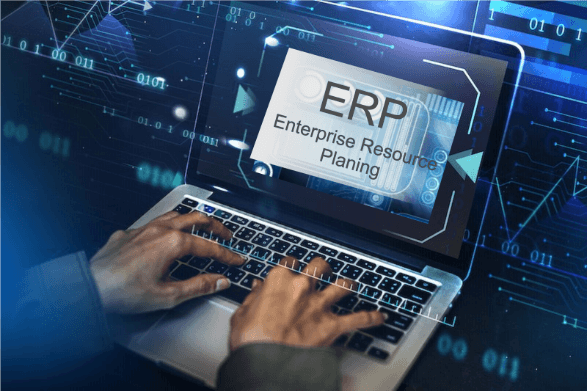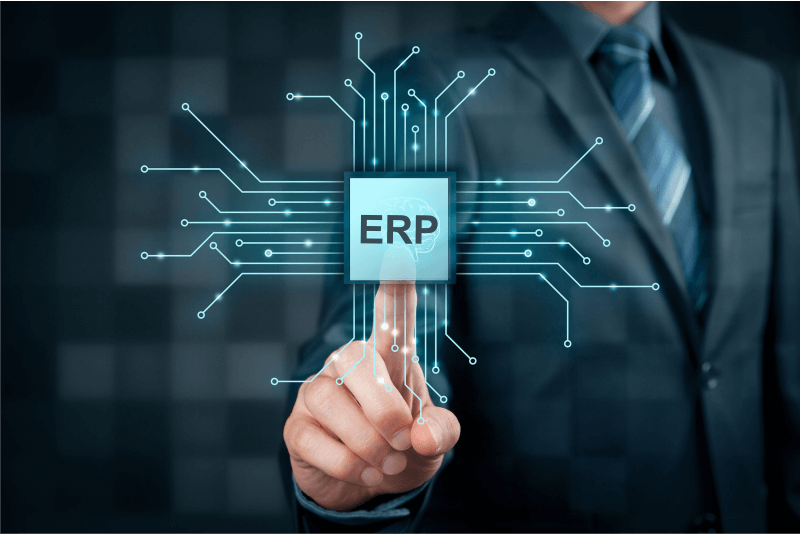Advantages and Disadvantages of ERP"Enterprise resource planning" refers to software corporations use to handle everyday activities such as finance, purchasing, project management, risk mitigation, & compliance. A skilled individual may take advantage of the numerous potent prospects that business resource planning software offers and turn them into profitable benefits. 
Advantages of ERPMore effective management- ERP solutions work as a hub that connects all parts of business operations that need administration, such as human resources, production, marketing, customer service, inventory, and supply. ERP software offers automatic data management most quickly and efficiently with computer technology. Enterprise resource planning technologies considerably reduce the amount of paperwork and the requirement for manual data entry. This advantage leads to a significantly lower likelihood of human mistakes that might impede production flow. Additionally, there is no requirement to transfer paper-based data into a digital form, allowing the appropriate human resources to be used elsewhere. Better coordination- ERP system that holds all data relevant to the business enhances the interaction between company divisions or departments. By reducing communication lags throughout the whole organization, ERP software increases productivity. This system is particularly advantageous if a business has a dispersed network of partners in numerous states or even across various continents. Report improvements- ERP software provides a convenient environment for quick and easy submission of all reports, from finance to inventory, customer service to technical maintenance, etc. This is because there is less paper to handle and better communication between departments due to the reduced paperwork. Cost-effectiveness- ERP systems enable lowering administrative expenses by reducing paperwork, simplifying everyday activities, and, most importantly, reducing repeated labor. Additionally, corporate processes like logistics, inventory and stock control, and others that need a variety of information requests & approvals are substantially accelerated by resource planning systems. Implements Data Security and Integrity- One of the most significant advantages of implementing ERP systems is data security. After all, the ERP system is based on data. Collaboration inside a firm is improved through sharing data between functional silos, including customer service, sales, marketing, and business development. The built-in protections of ERP solutions guarantee the safety of your data. Your business is better protected with on-premises and cloud-based ERP systems. Your sensitive and vital data can be automatically backed up in the ERP system's database. ERP systems that are cloud-based offer an extra layer of protection. Enhanced client services- Improving client relationship management is a further helpful advantage of contemporary ERP software. Since all necessary information about sales and customers is in one place, it is simpler for sales managers & customer support agents to interact with customers, and less time is spent responding to their needs. Additional advantages to the already mentioned include quicker and more accurate access to client records. For instance, carefully gathering and analyzing data on consumer behavior patterns may result in better plan improvements or more accurate forecasts of demand that must be met appropriately and on schedule. Detailed planning- The ease of access to most corporate data substantially helps its analysis chart a future development path. Using the aggregated data, the management team & business analysts may create new strategies or suggest changes to the existing ones with more success. Flexibility and scalability- The modular design of ERP software, which enables scaling it up or down based on demands and circumstances, is another intrinsic advantage. This characteristic allows for resource planning to readily adjust to corporate growth or decrease on every level. ERP systems can handle various changes, including production expansion, inventory expansion, and the addition of new operations, services, and users. Improved information availability and accuracy This benefit, more so than any other on this list, has an indirect impact on all the other benefits of enterprise resource planning. Modern ERP systems enable it to efficiently and centrally gather, process, and store data about manufacturing, sales, suppliers, or customers. As a result, only one data system needs to be utilized and maintained as opposed to several distinct databases that require regular inspections and synchronization to delete outdated or redundant records. An excellent achievement that further optimizes performance at all levels of the organization is the improved quality of all types of internal data and its simple accessibility to the personnel in any relevant department. The activity that gains the most from the installation of ERP is supply chain & inventory management in particular. Enhanced market competition ERP systems give the business the essential competitive edge to surpass competitors. While some firms continue to use tried-and-true techniques or cannot afford ERP systems, others invest in technology advancements and profit from them. Increased accessibility to management systems Resource planning (ERP) systems may be developed as web or mobile apps augmented with cloud technologies depending on the particular demands. They may then be used at any time and from just about anywhere and operate on smartphones, desktops, or other portable devices. 
Disadvantage of ERP
Because ERP software is so sophisticated, developing them is challenging and expensive. An experienced and extensive team with a high degree of competence is needed to build enterprise resource planning software to the customer's demands. High skill levels need costly hourly rates; hence the cost of a customized solution may be relatively high. ERP systems already built to order are quicker possibilities, but their license fees are also relatively high. While readymade systems are more affordable, they can come with less flexibility, lengthier customization times, potential maintenance and security issues, or even incompatible with business requirements and company operations.
There is disappointing news for you if you believe that the cost of ERP systems is too expensive. Such techniques require more labor and more financial resources to build and maintain. Pre-made systems need routine modifications that might add to the cost. However, consider the fact that these expenditures will ultimately pay off due to increased business efficiency.
Every person in the organization must use the system to adopt an ERP system to be effective. The staff needs training and instruction sessions to operate the system effectively so they can comprehend how things function. However, it could be challenging for a particular group to understand the entire ERP system procedure, particularly the older age. Failures in system implementation and operation may result from workers' lack of involvement.
The complexity of the product creates more significant demands for employees that use ERP software entirely. It may take a lot of time and effort to learn even the rudiments of a resource planning system, and it will take much longer to grasp all of its life. Another related issue is that when experienced Enterprise resource planning users leave a company, recruits who replace them must thoroughly learn the system before they can use it. However, you may speed up the learning process by giving out enough manuals and training materials in advance.
This drawback demonstrates that fully utilizing EPR systems requires time. Implementations, training, and acclimating to the new solution take time and patience. You will only have a significant return on investment (ROI) before fully understanding the system and how to use it.
ERP software adoption demands careful and exact adjustments, ranging from significant customization to fine-tuning. A specific enterprise's structure must be considered when designing systems, whether ready-to-use or made-to-order. The ConclusionYou may get a sense of the benefits and drawbacks of implementing an ERP system from the abovementioned points. ERP systems are not universal fixes that assure success every time. Instead, several advantages and disadvantages must be considered when assessing the necessity and economics of employing such technology. Enterprise resource planning systems come in various commercially available and bespoke configurations, but the advantages are essentially the same. They offer simple scalability, improve productivity and customer happiness, consolidate all data flow, simplify corporate operations, and save time and money.
Next TopicAdvantages and Disadvantages of Coffee
|
 For Videos Join Our Youtube Channel: Join Now
For Videos Join Our Youtube Channel: Join Now
Feedback
- Send your Feedback to [email protected]
Help Others, Please Share










